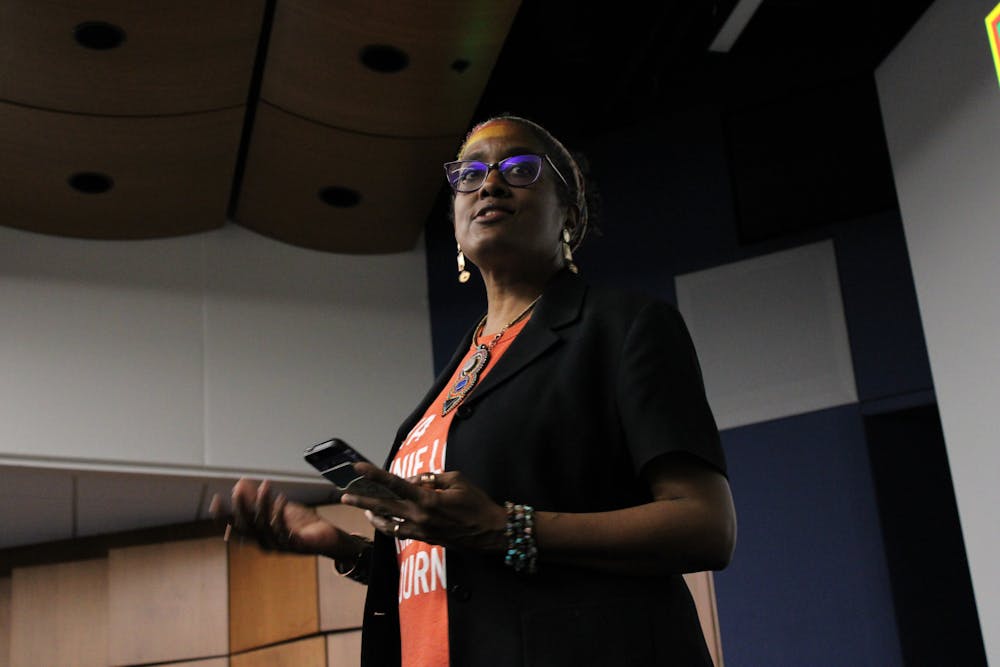As the first and only Black woman to serve as student body president at UF, Pamela Bingham is no stranger to spurring positive change while occupying predominantly white spaces. This Black History Month, she’s imploring UF students to do the same.
The 58-year-old UF alum visited her alma mater Thursday as part of the Black Student Union’s 2023 Black History Month program, speaking to a group of BSU students in the Reitz Auditorium.
On Wednesday, Gator Party announced Olivia Green, a Black woman, as its presidential candidate. Though the party has held all executive offices since 2019, Green is one of the first Black women to become its presidential nominee.
Donning a civil rights-themed shirt for this annual occasion, Bingham highlighted the successes she’d experienced in the months leading up to her election in 1986.
“I campaigned hard — all my people campaigned hard,” she said. “It was amazing.”
But while her notable win might have seemed like the culmination of an extensively planned campaign trail, it was actually the result of a nearly unplanned candidacy — stemming from her involvement outside of Student Government.
As the president of both UF’s BSU and chapter of Alpha Kappa Alpha Sorority, Inc., Bingham's prior leadership experience allowed her to seamlessly transition into a larger role without much trouble.
“I did not plan to run for student body president… but I had been involved,” she said. “And I won — that I planned for.”
But her win occurred alongside a particularly challenging issue that plagued members of the Gainesville community during the mid-1980s: the HIV/AIDS epidemic. Peaking in the U.S. around 1985, near the beginning of her presidency, this health crisis had a noticeable impact on UF students, she said.
“I did lose classmates to AIDS,” Bingham said. “I was there when [it] started.”
UF students who tested positive for the disease often didn’t return to campus, she said. And while she advocated for administration to give out condoms to students, her efforts were unsuccessful, she said.
Threats didn’t phase Bingham in her desire to uphold her presidential campaign — they were coupled with immense support she was given by those who advocated for her, she said.
“I had never been threatened the way I was here,” Bingham said. “I knew I had to go on because of that level of people who had faith in me.”
As the first Black woman to serve as UF’s student body president, Bingham sparked important conversations about on-campus diversity.
As one of the few Black residents of East Hall, the then honors-only residential hall, her campaign marked a huge milestone for UF minority students. But fighting against issues like poor academic advisory and rising tuition costs, Bingham led initiatives that benefitted the campus community — as a whole.
“We fought tuition increases, and we were successful,” she said. “We promised, and we had delivered.”
Since graduating from UF’s College of Engineering, Bingham’s been extensively involved in community outreach and environmental initiatives as a coordinator for Howard University’s Urban Environment Institute and Virginia Commonwealth University’s Petersburg Wellness Engagement Project — focused on alleviating local health challenges faced by community residents.
She currently serves as the operations manager for the Center for Community Engagement, Environmental Justice, and Health, under the University of Maryland’s School of Public Health, where she furthers her personal mission to lessen the impact of public health disparities.
Bingham has had time to reflect on how she wants to see Black students continue her legacy, she said. To her, unity among minority groups on campus represents a meaningful first step.
Staying silent as other students experience struggle is an injustice, she said.
Her comments come amid a spike in antisemitism at UF.
Referencing the anti-Jewish messages that were recently written in chalk throughout campus, she believes these instances of discrimination are something all students — regardless of racial identity — should be concerned about, she said.
“You may not think that the antisemitic chalk is our business,” Bingham said. “But just like Black History Month, it should be everyone’s business at the university.”
This sentiment rang true for students like Sophia De La Cruz, a 20-year-old UF political science junior. Black History Month should be an important occurrence for all racial groups, as it represents a significant piece of American history, she said.
“It’s important to highlight our contributions and our lives,” she said. “A lot of [people] don’t really think that side of humanity even exists.”
Bingham left attendees of her guided Q&A session with one key piece of advice: Remain optimistic. While some still encounter tribulations similar to the ones she faced during her presidency, Black UF students should prioritize staying hopeful while influencing change within the Gainesville community, she said.
“Get engaged,” Bingham said. “Black history is American history — it’s world history.”
The UF BHM Cabinet will continue to celebrate Black History Month throughout the coming weeks. Centered around the theme “A Million Dreams,” the month-long celebration will feature a Black hair expo, a cookout and a BSU-hosted pageant, among other events.
BSU’s next celebratory event is scheduled for Feb. 4.
Contact Halima at hattah@alligator.org. Follow her on Twitter @HalimaAttah.

Halima Attah is a first-year journalism student and university reporter for The Alligator. When she’s not writing, you can probably find her thrifting on Depop or listening to her carefully curated Spotify playlists.






